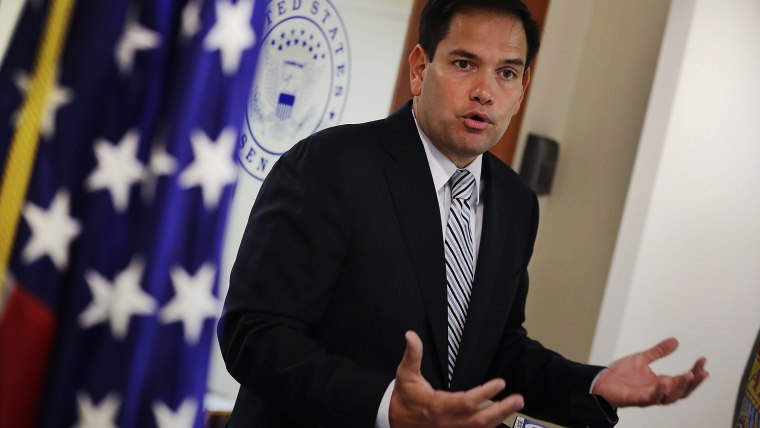Despite voting for the Republican tax plan late last year, Sen. Marco Rubio (R-Fla.) started distancing himself from it soon after. Just a couple of weeks after the regressive proposal advanced through the GOP-led Congress, the Floridian conceded that he and his party "probably went too far" in delivering massive tax breaks to big corporations, adding at the time that the Republican package "isn't going to create dramatic economic growth."
Rubio is now going just a little further.
Democrats frequently claim Republicans' corporate tax cuts enriched big businesses while doing little for workers, but now that line of criticism is coming from a prominent Republican: Sen. Marco Rubio."There is still a lot of thinking on the right that if big corporations are happy, they're going to take the money they're saving and reinvest it in American workers," the Florida senator told the Economist in a recent interview. "In fact they bought back shares, a few gave out bonuses; there's no evidence whatsoever that the money's been massively poured back into the American worker."
MSNBC's Kasie Hunt noted that Rubio "shredded" his party's arguments on the tax plan, which his GOP colleagues "are still making literally every day on Capitol Hill and in campaign ads."
What's more, Rubio's observations have the benefit of being true. In fact, they coincide with a New York Times report, published overnight, pointing to increased corporate spending on buying back stock, not capital investments, as a result of the Republican tax plan.
What's less clear is why the Florida senator voted for the legislation in the first place.
It took Rubio very little time to recognize the fact that his party's tax package went too far in helping big corporations, won't dramatically boost the economy, and isn't making much of a difference for workers.
So why support it? This isn't a situation in which a lawmaker reflects on a provocative decision many years after the fact, and recognizes with the benefit of hindsight that a plan didn't work as intended. Rather, Rubio voted for the legislation on Dec. 19, and started criticizing it nine days later.
He couldn't have come to these conclusions a little sooner and made a difference before the bill passed? Why is it Rubio's bite never seems to be as tough as his bark? (Let's not forget, in mid-December, Rubio suggested he might oppose the plan, putting its future in doubt. He reversed course quickly thereafter.)
Nevertheless, the senator's comments serve as a reminder that the Republican Party's predictions about its tax cuts aren't holding up especially well. GOP leaders said the plan would boost capital investments, included pass-through provisions that would help small businesses, would deliver big benefits to the middle class, would pay for itself, and would be popular with the American mainstream.
None of these predictions has come true.
Democratic predictions about the plan, on the other hand, are holding up quite well.
